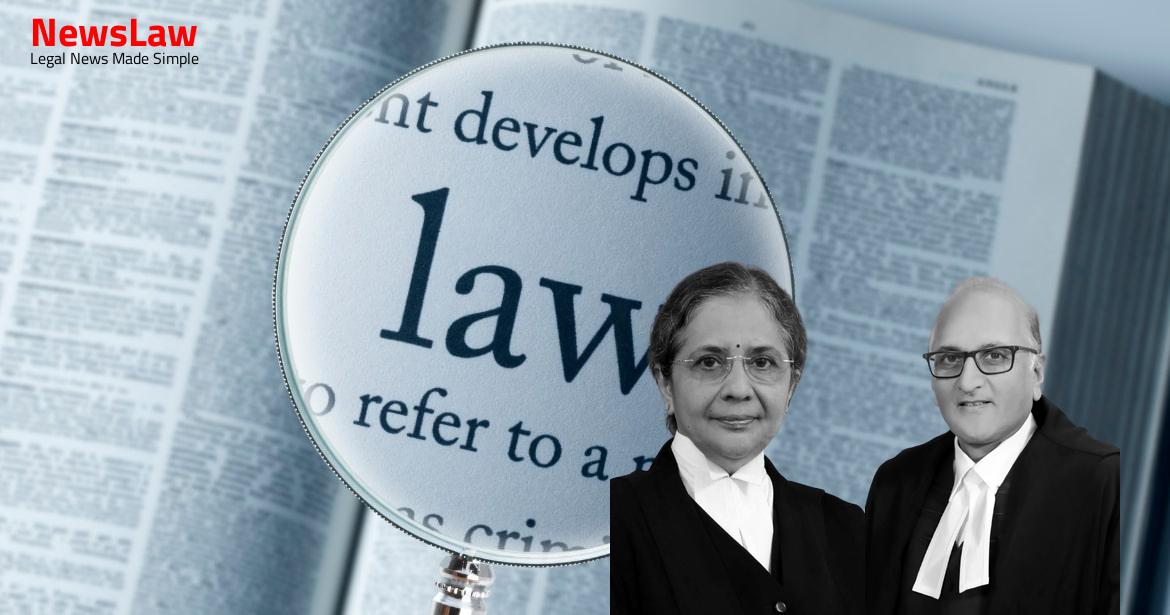A recent judgment by the High Court delves into the nuanced legal aspects surrounding the reporting of vacancies and promotions in a government department. The court’s analysis provides insights into the necessity of adherence to established procedures and timelines in matters of recruitment. Let’s explore the key considerations and implications of this significant legal ruling.
Facts
- The High Court dismissed the Writ Petition on 02.07.2019 as being filed belatedly.
- Some petitions filed by the department had Review Petitions followed by Writ Petitions, while others remained unchallenged.
- The appeals were heard with the consent of the parties’ counsel.
- The Director was aggrieved by the final judgment and orders of the High Court dated 24.07.2019, 02.07.2019, and 19.06.2019.
- The Director’s petitions challenged orders of the Kerala Administrative Tribunal regarding reporting vacancies in specific posts.
- The Indian System of Medicine and Insurance Medical Service Department had to report vacancies to KPSC within the duration the list was operative.
- Applicants sought a direction for the department to report 65 vacancies before the list’s expiration on 18.11.2017.
- A Review Petition (657/2019) filed by candidates was rejected; they were included in the ranked list published on 19.11.2014.
- 33 anticipated vacancies were reported on 08.11.2017, and an interim order on 14.11.2017 took care of reporting 28 provisional vacancies.
- KAT accepted the argument that 28 vacancies arose from the promotion of eligible Medical Officers as Senior Medical Officers.
- KAT noted 15 additional vacancies apart from the 28 reported, requiring selection by KPSC.
- The Department filed O.P. (KAT) 256/2019 in Kerala High Court, which was considered and disposed of on 03.08.2018.
- The KPSC issued a notification on 19.11.2014, leading to proceedings under Section 19 of the Administrative Tribunal Act before KAT initiated by applicants on 14.11.2017.
- An interim order was granted by KAT on 14.11.2017.
Also Read: Electoral Malpractices in Mayor Election
Arguments
- The dismissal of the petition based on delay was found to be in error.
- Government Order No. 459/2017/Ayush dated 11.10.2017 led to 16 vacancies in the Medical Officer (Ayurveda) post.
- The High Court was criticized for rejecting the Department’s petition on technical grounds.
- Delay was not a valid reason for rejecting the petition as the matter was still pending.
- The life of the ranked list was extended by a year beyond the initial two years.
- The KAT’s reasoning in its order dated 03.02.2018 was emphasized.
- The filing of a Review Petition indicated that the matter had not been finalized in the Department’s perspective.
- The affidavit from the Director highlighted that promotions had only resulted in higher grades, not new appointments.
- Omissions in reporting vacancies and promotions led to candidates seeking judicial remedies.
- The KAT found that there were sufficient vacancies that needed reporting.
- The department failed to provide a valid reason for not reporting the vacancies.
- The vacancies had to be reported to the KPSC for appointment and further process.
- The posts and promotions were governed by the Indian System of Medicines (Kerala Service Rules, 2005).
- The KAT’s order with respect to vacancies arising after the promotion order dated 20.06.2017 was justified due to the absence of any sound reason for not being reported.
- The Departmental Promotion Committee convened for the promotion of 140 Medical Officers to the post of Senior Medical Officers, resulting in 115 vacancies.
- The relevant category of posts, Senior Medical Officers, were to be filled only by promotion from the cadre of Medical Officers, a decision consciously taken into account and considered by the KAT which issued directions.
Also Read: Balancing Power and Transparency: Electoral Bonds Struck Down, Disclosure Mandated
Analysis
- The High Court rejected the Department’s Writ Petition for being tardy, despite the KAT’s order being just a year old and the filing of a review petition.
- In cases of public ramifications like recruitment, final judgements bind all concerned even if the normative basis of the judgement under appeal is disturbed.
- The KAT directed 28 vacancies to be advised without any material showing government lethargy in reporting vacancies, and the High Court’s reasoning was considered cavalier.
- The department’s explanation that all vacancies were reported was supported by a tabular chart, indicating the government’s diligence in providing appointment opportunities during the ranked list’s validity.
- The KAT’s ruling was based on unreported vacancies and promotions leading to vacancies, disregarding the department’s clarification on promotions not necessarily creating vacancies due to an excess of Medical Officers.
- A significant number of vacancies were advised, and appointments were made accordingly, showing the government’s active approach to recruitment during the ranked list’s duration.
- Ranked lists published by the Commission remain in force for one year from the date of issuance or until three years, whichever is earlier.
- Exception for ranked lists for admission to Training Courses leading to automatic appointment; will remain valid until the new list is published after one year or until three years, whichever is earlier.
- Selection for admission to certain courses like Forest Rangers Course and Diploma Course in Forestry must be made annually according to Government instructions.
- Notification for recruitment does not guarantee the right to the post.
- Selected candidates do not acquire any right to the post upon selection.
- The case of Shankersan Dash v. Union of India highlights that successful candidates do not have an indefeasible right to be appointed.
- The case of Shenoy & Co v. Commercial Tax Officer establishes that the state or public agency can challenge a judgment by filing an appeal against only one party.
- Judgment and orders of the High Court cannot be sustained
- The KAT should not have inquired further once all vacancies had been reported
- Evidence of reported vacancies provided in department reply and tabular chart
Also Read: Recall of Resolution Plan Approval: Legal Analysis
Decision
- The judgment and order of the KAT are set aside
- The appeals are allowed
- No specific order on costs
Case Title: THE DIRECTOR OF INDIAN SYSTEM OF MEDICINE Vs. SUSMI C. T. (2021 INSC 839)
Case Number: C.A. No.-007537-007544 / 2021



